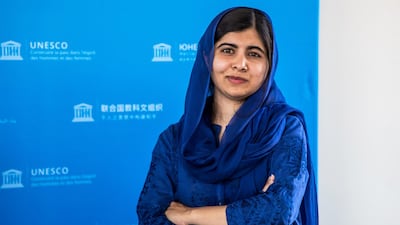Education campaigner Malala Yousafzai raised the alarm over Britain's foreign aid cuts which she said could hinder her drive to ensure schooling for girls.
The Nobel Peace Prize winner, 23, spoke to UK Prime Minister Boris Johnson on Friday and said she applauded his dedication to girls' education.
But she said she was "concerned he won't reach his goal of helping 40 million girls go to school" unless Britain restores its commitment to spend 0.7 per cent of national income on foreign aid.
The commitment was reduced to 0.5 per cent in a spending review last year, in a cut which ministers blamed on the "seismic impact of the pandemic".
Ms Yousafzai's warning comes after a string of charities including Oxfam and Save The Children joined a statement condemning the aid cuts as a "tragic blow for many of the world's most marginalised people".
The charities accused ministers of "making cuts with no consideration for the human harm they will cause".
"These cuts will trim UK borrowing by a fraction, but devastate lives across many of the world’s poorest countries," the statement backed by 200 NGOs read.
"The UK’s hard-won reputation for international leadership in aid is in tatters."
Ms Yousafzai also called on the UK to commit £600 million ($831m) to the US-based Global Partnership for Education.
The UK committed £225m to the project in 2018 in a three-year plan that expires this year.
Britain is due to co-host a Global Partnership summit with Kenya later this year.
Asked to respond to Ms Yousafzai's comments, Downing Street pointed to a tweet by Mr Johnson which said the UK was using its G7 presidency to lead efforts to get more girls into school.
"I spoke to Malala this morning about how girls' education is one of the smartest investments countries can make as we build back better," Mr Johnson said.
Ms Yousafzai became the world's most famous education activist after her campaign for girls' schooling led to an assassination attempt by the Taliban when she was a teenager.
After recovering from the shooting, she became the youngest ever Nobel Peace Prize laureate at 17. Last summer she graduated from the University of Oxford.
Last year she was among those to urge Britain not to cut its foreign aid commitments during the spending review.
However, the cut was announced in November in what ministers described as an "overhaul" of foreign aid.
The government insisted when the cut was announced that the reduction to overseas aid was temporary.
The 0.7 per cent threshold would be restored when the fiscal situation allows for it, ministers said.
The move drew criticism at the time from former UK prime ministers David Cameron and Tony Blair.
The cuts come in a year in which Britain tries to position itself as a global leader by chairing the G7 and the Cop26 climate summit.
Campaigners say the budget cuts hit 32 of the 45 countries most at risk from climate change.
“As the host of Cop26, the UK has a huge opportunity and responsibility to bring the world together behind a plan to tackle climate change and support the communities worst affected,” said Save The Children's chief executive Kevin Watkins.
“Calling on other countries to do more while the UK does less is a dereliction of leadership.”


